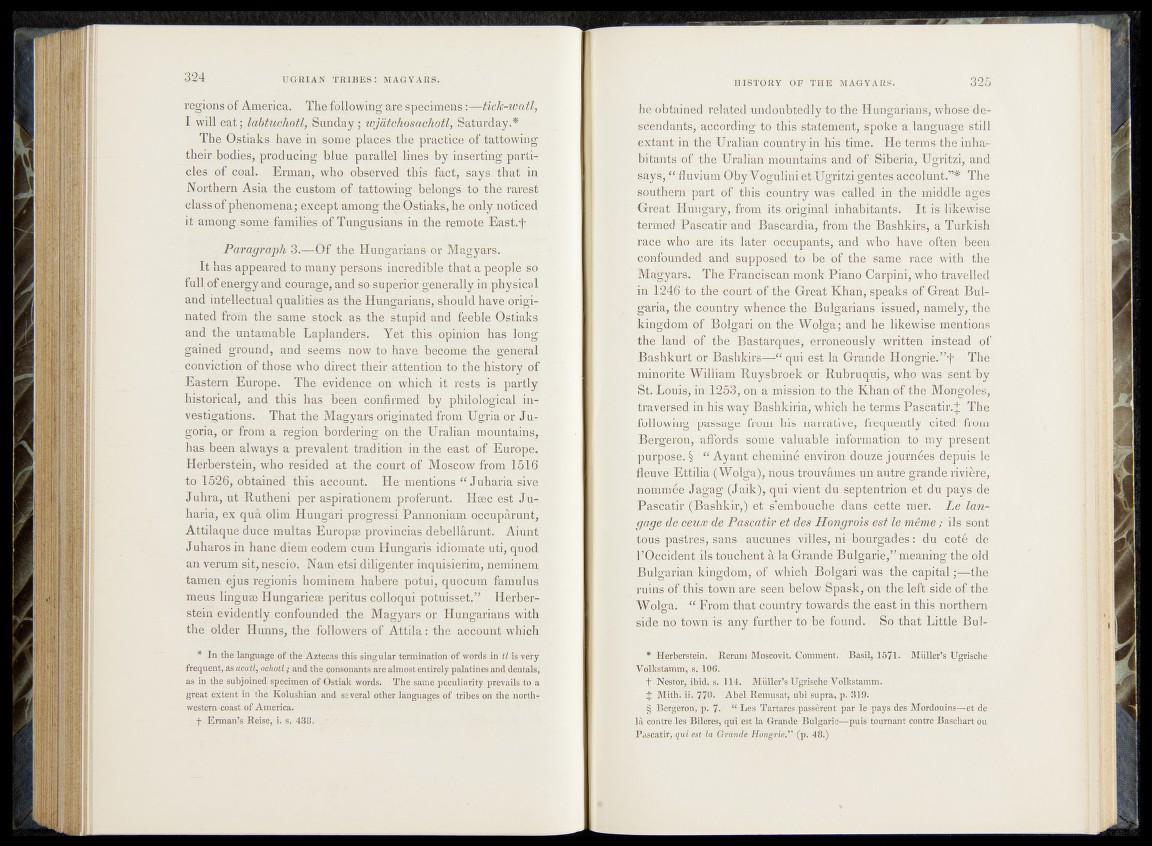
regions of America. The fol lowing are specimens:—ticlc-watl,
I will e a t; labtuchotl, Sunday ; wjatchosachotl, Saturday.*
The Ostiaks have in some places the practice of tattowing
their bodies,) producing blue parallel lines by inserting particles
of coal. Erman, who observed this fact, says that in
Northern Asia the custom of tattowing belongs to the rarest
class of phenomena; exceptamong the Ostiaks, he only noticed
it among some families of Tungusians in the remote Eastif
Paragraph 3'.—Of the Hungarians or Magyars.
It has appeared to many persons incredible Jthat a people
full of energy and courage, and so superior generally ip physical
and intellectual qualities as th e Hungarians,should have *n i_i-
nated from the same stock as the stupid and feeble Qstiaks
and the untamable Laplanders. Yet this, opinion -dias lqng
gained ground, and seems now to have become the general
conviction of those who direct their attention to the history,of
Eastern Europe. The evidence on which if.,^p%is#partly
historical, and this has. been confirmed by philological investigations.
That “the Magyars originated from LPgria,or Ju-
goria, or from a region bordering onthe'XJralian mountains,
has been always a prevalent tradition in the cast of Europe.
Ilerberstein, who resided at the court of Moscow from l | p 6,
to 1526, obtained this account. He; mentiqns “ Juhatia sive
Juhra, ut llutheni per aspirationem proferunt.
haria, ex qufi. olim Hungari progressi Pannoniam occuparunt,
Attilaque duce multas Europse provincial debeliarunti / Affah
Juharos in hanc diem eodern cum Hungans idiomate~uti, quod
an verum sit, nescio. Nam etsi diligenter inquisierim, neminem
tamen ejus regionis hominem habere potui, quocum famulus
mens linguae Hungaricae peritus colloqui potuisset.” Ilerber-
stein evidently confounded the Magyars or Hungarians with
the older IImans, the followers of Attila: the account which
* In the language of the Aztecas this singular termination of words-in t l is very
frequent, as a e d t o c h o t l ; and thejjonsonants are almost entirely palatines and dentals,
as in the subjoined specimen of Ostiak words. The same.peculiarity prevails to a
great extent in the Koludhiian an4 several other languages of tribes on the nprih-
westerh coast of America.
. f Erman’s Reise, i. s, 438. . S
he obtained related undoubtedly to the Hungarians,'whose descendants;;
accordiii^to this statemërif, Spoke a.language still
extant" i'n'the LTralian country in his time. He terms the inha-
bi'fanïts^df 'IheEralian mBilhtams and of Sibèria, Ugritzi, arid
saysju fluvidrh'©WY-fegtillili et>UgritZfgentes âeéôlunt.,,# The
southern "pafft of * f to ^country YVàs'^llë’d' ih the iiiiddle ages
Great1 Hungary, from;J its original''inhabitants : I t is likewise
termed Pascatir utid1 Bas'cardia, ffomf'thê Bashkirs; a Turkish
race who are tits later soCdupants, and who have often been
cou&unded a n d su p p o sed to ^be ’of th ^ s am e race’ with thq
The. Franciscan monk Piano^GSfpiniyWho travelled
inTÎ2É#-to the court of thé Great Khan; spnaks ofGreatiBul-
garià, bbe country whence the Bulgarians-tfssued) namely,"the
kingdom of Bolgari on jg^Wolg^.; and hilUikewfedmentions
tho^aniiïof the B as tar quriliMBfoniously written instead of
Bashkurt or Bas hk i r s—If: qui .'pit1 la .Grande Hongrie.’/j; The?
nrinoS%e William BuysbronSj%!pBuhYuquisyw^%w^s sent by
Louis} iribil^rtè,1 fe ja misiiofe^o the Khan o fib e -Mompble^y
traversed in Ms way Bashkiria, wMch he terms Paseatir:+ The?
J foliowingrfaiæ^from.. his narrative! ?frequentfy^ited " from
Befgeii|rij- affords some valuable information to-n®y present
purpose. § 11 Ayant cheminé environ douze j bUrri^Sdepuis'Icy
fleuVe-;Ettilia-(Wt)l§ab nous trouvâmesrinaùtrègrande rivière^.
nômmée"iFagà^r(J aik)|'(|ni?Yibnt du fen trio n et d u ’pay Side
Pascatir (Bashkir,).'-el ^temjii&àriïïe d 'a n l J^HWtaÉèK>'-
gagé deceuoe de Pascatîr et des Hongrois est le m ême yi-ils) sont:
itéus pastres', sans aucunes villes, de
l ’Oecident ils touchent â* la Grande Bu 1 garie/ ’ mèaning^'the'pick
Bulgarian kingdom, of which Bolgatii was -tfee'chpital the
ruins of this town are séen below- Spa.s.l|p^^titë: left side of the;,'
Wolga. “ From that country towards .the east in 'tfegriorthem
side no town is any further- to *pê'found. -Jpb-thàt Little Bui-
* Herberstein. Rerum Moscovit. Comment. Basil, 1571. Miiller’s Ugriscfie
Volkstamm, s. 106.
t Nestor, ibid; s. 114. Muller’s Ugrfec^he-Volkstamm. *
$ Mith. ii. 770. Abel Remus&tyiibi supra, p. 319;
§ Bergeron, p. 7. j^Pbes Tartares passèrent' par le pays des Mordouins—et dè -
là contre les BiletéSy tjrd est la Grande Bulgarie—puis tournant Contre Baschart Qu .
Pascatir, q u i 'Gxkfride,‘H ro f t g 48.)